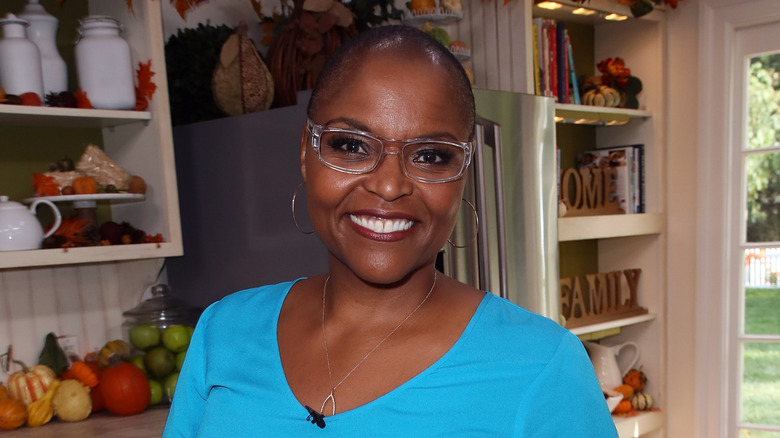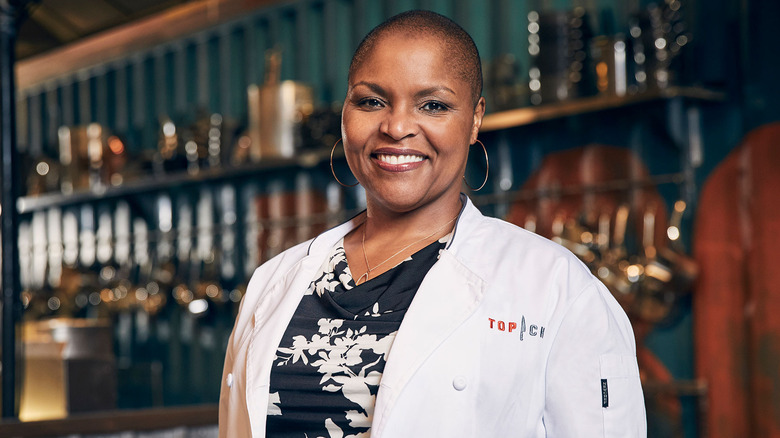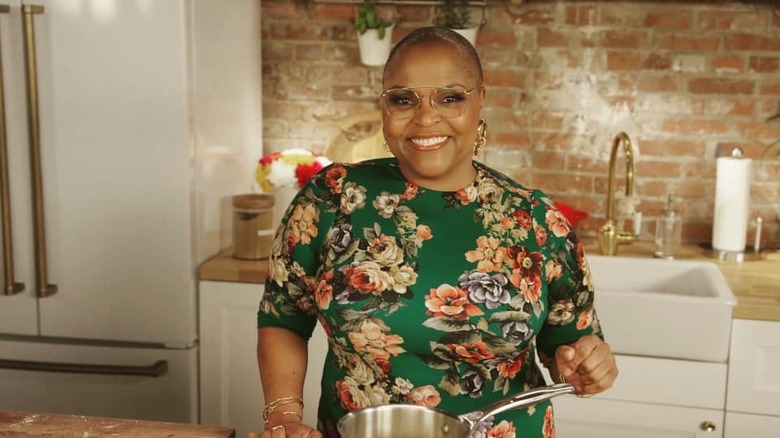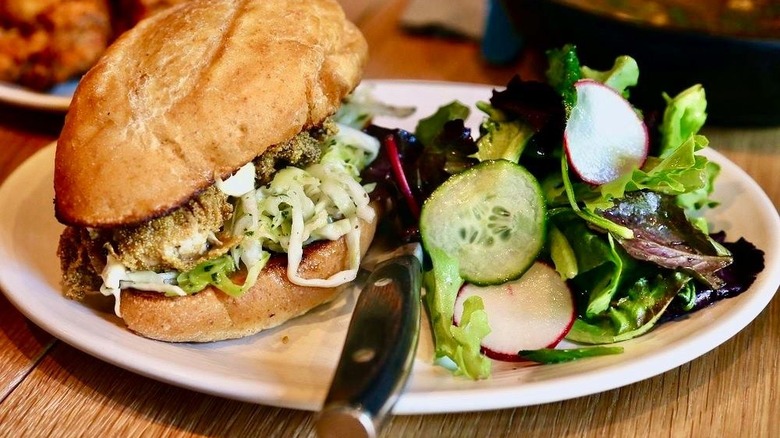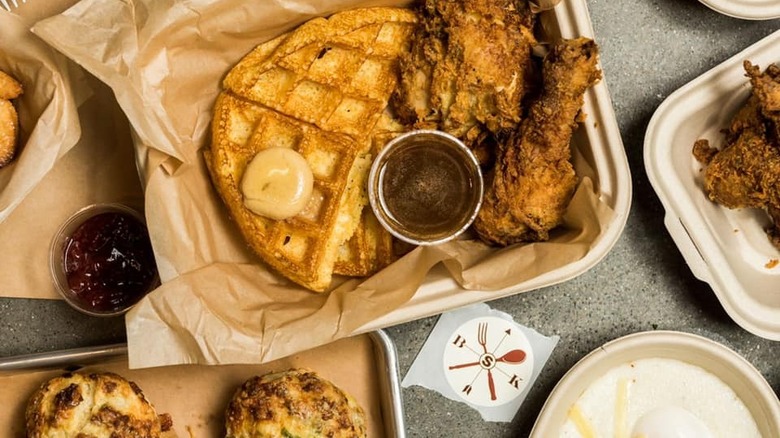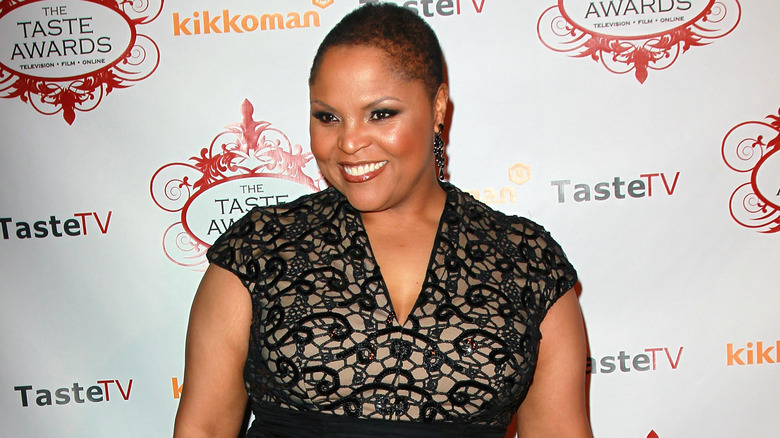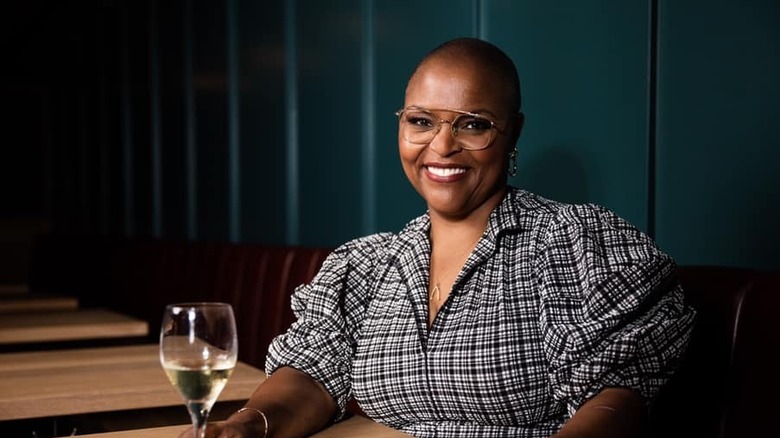Tanya Holland Dishes On MasterChef And Gordon Ramsay - Exclusive Interview
They don't call it "MasterChef" for nothing. Now entering its 12th season, this Gordon Ramsay vehicle is guest-judged by culinary all-stars who each are masters of their own unique brands of cuisine. The drool-worthy list includes Aaron Sanchez, Joe Bastinich, and none other than soul food celebrity Tanya Holland, who, in addition to this role, has been on "Top Chef," "Selena + Chef," and has her own cooking show on the OWN: Oprah Winfrey Network, "Tanya's Kitchen Table." The founder of the award-winning Oakland, California-based food restaurant, Brown Sugar Kitchen, Holland also has a podcast and is the author of several cookbooks.
So what's it like to rub chef-jacket-clad elbows with all of this star power, while growing your own base of foodie fans? In an exclusive interview with Mashed, Holland offered a behind-the-scenes peek at what goes really on behind the scenes on cooking TV shows, revealed what Gordon Ramsay and Selena Gomez are like in person — and set us straight about what many people get wrong about the roots of soul food.
Chef Tanya Holland discusses what it was like working with Gordon Ramsay
What is it like to be a guest judge on "MasterChef"?
Well, it was great. This set, first of all, is just stunning. So you really feel like you're Hollywood when you're there. You've made it. Big lights. It was my first time meeting Gordon [Ramsay]. He's got a big personality, big presence — so, really nice to meet him. And Joe [Bastinich], I'd never met before. And Aaron [Sanchez] and I kind of go way back. So it was nice to see them — a little reunion. Sherry [Yard], also a colleague who I've admired for a long time, and to meet Val [Cantu] and Jonathan [Yao] for the first time. We had a great rapport. I think we had very complementary personalities and things we brought to the table. And it was just fun to see these contestants with their heartfelt efforts to compete, and how important it was for them, and how proud they were. And serious, for non-professionals!
What is Gordon Ramsay like in person?
Everybody knows his television persona, and I'd been told that off-camera, he's really more "regular." He's definitely funny! He's very intelligent, clearly, and very personable. So I really like spending time with him, and just watching how he runs his show. And I'm always trying to learn myself, so that was great. And then how he is with the contestants, challenging them, but giving them good, helpful criticism. Sometimes it might seem harsh, but it's the nature of our industry, as well. We've all been there.
Does Gordon Ramsay's television personality reflect the way he is off-camera?
Yeah, he has a big personality and a big presence. Clearly. And he's been doing this so long, he's confident in what he's doing and what he's created, and that definitely comes across.
Chef Tanya Holland shares her experience as both a competitor, judge, and teacher
What was it like to cook with Selena Gomez on "Selena + Chef"?
It was great. I mean, she definitely had more skills than I imagined. She's clearly been brought up to take care of herself. Her grandparents have played a big influence, and they cook. They were on the show. She had a great, sweet rapport with them. She's very respectful. And I didn't find her to be bratty in any way, which someone of her age, who's had so much success, could be a certain way. And I just thought she was really kind and sweet. And curious, and wanted to learn, and wanted to do something really well. And the producers said that of all the chefs that she had cooked with at that point, the food she cooked with me looked most like what I had cooked. So they thought that meant that I was a good teacher. So I'm going to take that!
You've been on many cooking shows. Which was your favorite and why?
It's much more fun being a judge than being a contestant. It's really challenging. I don't know. I don't know if any of them are really "fun." It's just a challenge to teach, I mean, to cook on the spot like that. "Top Chef" was the most recent, and I had definitely left there with a lot of good friends. So that's something that I'm really grateful for.
What goes on behind the scenes of cooking shows that might surprise people?
Yeah. I think it's probably surprising that we really are thinking on our feet, and we can't have any recipes. We can't have any access to the internet. And that's why it's really important all along, no matter what level of cooking you are, is to write stuff down. Cook some of your favorite dishes over and over again, and kind of memorize things. It's really, that repetition is really helpful.
How else should a contestant prepare to be on a cooking show?
I think just look at every opportunity as a learning opportunity. There's so many resources now. Read all the books you can; the cookbooks. Find your favorite recipe blogs; follow them — there's certain chefs. You can learn as much dining out and just taking some notes. Go to the farmer's market or the supermarket and just grab something you've never worked with before, And then Google a recipe for it, and just play with it. I would just have fun.
The story behind Brown Sugar Kitchen, according to Tanya Holland
What inspired you to start Brown Sugar Kitchen?
So I had worked in the front of the house of restaurants for about five years in college and then in New York. And I was really inspired by the creation of environments — just the design, the wine list, the uniforms, the lighting, the florals, the whole ambiance, and theme and naming. And I didn't know of, or had seen, many restaurants that reflected African-American diaspora that had been elevated and executed — the food, the decor, and all those elements — on a high level. Sometimes it was the room. Sometimes it was the food. Sometimes it was a service, but there weren't a lot of examples. And a lot of that is because of lack of access.
So I just decided that this was something I wanted to try to create. And so I really wanted to do a bistro that was more refined, but then I found a space in a neighborhood [in Oakland, California] that was kind of emerging, or re-emerging, after being very marginalized, and I needed a concept that was really accessible. And so I came up with the name Brown Sugar Kitchen, and we were just open for breakfast and lunch, because the neighborhood was not a dinner destination spot, or did not have enough residents. So I became known for that. I really just pivoted my concept based on opportunities that were presented to me, and would have never predicted that we would still be in business doing what we're doing.
We've been fortunate to move a couple of years ago to a more elevated space, which is what I always wanted. And now serving dinner because we're in a more of a residential neighborhood, or active residential neighborhood ... So, it's a mixture of my heritage and my training in France and New York, and now living in California [and] my access that I have in California to seasonal produce and organic and local ingredients.
Do you feel that Brown Sugar Kitchen's success has put a spotlight on the concept of soul food?
Yes, I do. I think, not just soul food, but other ethnic cuisines that are generally, or have generally, been perceived as very humble cuisine. I think now people are valuing more [of] that like, "Oh, that can also be something that I dine on and I drink wine with it, or I go for a special occasion and the room can be nice." And so I definitely think that I've contributed to that.
This is what people get wrong about soul food, according to Chef Holland
What is the biggest misconception about soul food?
I think that it's heavy and it's fat — that it's bad for you. And that's just not the case, because the origins are from the garden. The origins, are not very protein-centric because that wasn't affordable. So the protein was really more of an accent to the vegetables or the beans or the rice or the potatoes.
Do you have a favorite item from the garden that you like to cook with?
Oh, let me think. We have a garden plot now at the museum, and there's just so much great stuff coming out right now. We have squash and cucumbers and tomatoes and lots of herbs. And for me, that's just a great summer simplicity. Making a cucumber tomato salad, with some red onions and light vinegar, was really one of my mom's staple condiments at the table. So it definitely sticks with me.
Is there one underrated soul food dish that you think everyone should try at least once?
That's a good question ... I mean, there's so many ingredients that people haven't had the right way that they say they don't like! Like I've had people say, "I don't like sweet potatoes or yams," and then they have mine and they like them. And the same with black-eyed peas. If they're cooked for a long period of time, they might taste really too dirty and too earthy. And even with collard greens, I think. So, having any of the ingredients cooked the right way could really change people's minds about them.
Why are chicken and waffles such a popular soul food combination?
I have no idea. It's funny, I moved here and I tried some in a restaurant, and I thought I could do these better. And when I opened, I just had one waffle maker and I just knew I wanted to serve fried chicken and I was like, "Oh, and we have a waffle." And then it just took on a life of its own. And I just think people really are drawn to the idea of sweet and savory, especially at brunch where they can't make up their mind. It's actually a really good combination. And I think it's even better with our house-made apple syrup, because I just think the apples and the corn mill in the chicken are really complimentary.
Chef Holland shares details about what she eats and how she cooks
What do you typically eat in a day?
Oh my gosh. I was just thinking, "Oh my God, I need to eat something now!" Fortunately, unfortunately, I don't typically eat anything. I need to get into more of a rhythm. But my favorite is just fish, served simply with maybe a nice little relish or salsa. Or a romesco sauce, and salad or vegetables. I try to eat that because I do dine out frequently, because I like to go see how my colleagues are cooking, and then you don't really have as much control. And then of course I want the bread, and the pasta, and all that stuff. So when I'm home, I'm trying not eat that stuff.
Do you normally eat breakfast, lunch, and dinner?
I try to eat breakfast, lunch, and dinner. I don't. Breakfast is the most important meal, and I serve it a lot, and I find myself missing out on it, and then eating lunch and then relaxing at dinner time. I drink a lot. I drink juices. So like green juice, and sometimes smoothies and shakes, just to try to supplement. Just because I'm on the go a lot.
If you could offer one cooking tip, what would it be?
One cooking tip. Hm. I mean, you have to taste as you go along. You just have to taste your food. I just witness so many new cooks just not tasting their food.
What's one ingredient no kitchen should be without?
It's a toss between onions and garlic. Like, you've got to have one or the other.
Are you more of a "savory” than "sweet" person?
I am now. Yes, I am now. I cook more savory. I can cook sweets, and every now and then I want a bite of sweet. When I was younger, I was more of a sweet tooth, but, yeah, I prefer savory.
What it was like for Tanya Holland start a podcast about food in the middle of a pandemic
You started a podcast, "Tanya's Table." What's that experience been like?
The podcast was really fun. I got lucky that it happened during COVID, and there was a lot of really cool people with more availability. And so it was another thing, almost like cooking. Like you just got to keep doing it and practicing and plan. Try to learn from others, listening to other podcasts. And I felt like they got better and we're slowly working on season three, which is fun. It was well-received, and it's just a fun way to just connect with people about food, but not being able to get together with people as much as we could before.
Is it challenging to do a podcast, which is auditory, about food, which is something you taste, smell, and see?
Yes. You have to be really creative. We have to think more. And it's as if you're just describing it almost in a book, [and] I've written a couple books. So how would you describe something that somebody can't have in front of them? And just dig deep into the well for good descriptors, and hopefully making people's mouth water. But we also talked about cultural things, and the food people grew up with, and what are some of their favorite things and what they cook at home.
Who is the most intriguing guest you've had on your podcast?
It was Ericka Huggins. And she's a former Black Panther who was jailed for two years after she had just had her baby, and became a vegan while imprisoned, and also practiced yoga. And she was part of the free breakfast program established here in Oakland with the Black Panthers. And I had to end the conversation after an hour, and I really didn't want to. She was just fascinating. Just an amazing, warm, intelligent open-hearted person. It's just unbelievable that she went through that. And her son used to cook for me. So she's a regular customer. So we have some relationship, too, but I didn't really know her.
Catch Chef Tanya Holland as a guest judge on "MasterChef's" September 1 episode, and check out previous episodes of her podcast "Tanya's Table." Of course, if you happen to be in the Oakland area, be sure and stop by Brown Sugar Kitchen to get your soul food fix.
